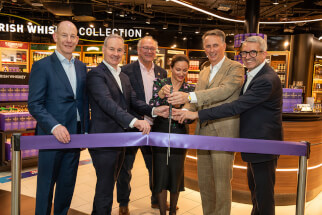IAADFS webinar covers vaccine distribution & consumer confidence

Throughout the interactive webinar, a list of shared topics was addressed by each panelist including the introducing of a vaccine, restoring of consumer confidence, securing of government support, expanding e-commerce and training of salespeople to adapt to changing consumer behaviors
This week, IAADFS hosted an interactive webinar, “Managing Through COVID: From Crisis to Recovery”, featuring Rene Riedi, Chairman, IAADFS, and Divisional CEO, Dufry America, and an expert panel of duty free and travel retail insiders:
Jackie McDonagh, General Manager, North America, Aer Rianta International
Matthew Greenbaum, VP, Business Development, International Shoppes
Erasmo Orillac, Chief Executive Officer, Motta Internacional, SA
Following an introduction by Michael Payne, President & CEO, IAADFS, who discussed the association’s participation in a coalition of representatives from across the industry (food and beverage, hospitality, airport councils & executives) to raise awareness and educate lawmakers about the importance of the airport ecosystem, Riedi welcomed the panel to discuss the future of travel retail.
Throughout the webinar, a list of shared topics was addressed by each panelist including the introducing of a vaccine, restoring of consumer confidence, securing of government support, expanding e-commerce and training of salespeople to adapt to changing consumer behaviors.
In addition to the prioritizing of health and safety, one thing is clear: the common knowledge that the travel industry is in need of a unified international response to the pandemic.
Across Canada international traffic has been consolidated among four airports in Toronto, Vancouver, Montreal and Calgary. Considering the worsening state of COVID-19 and varying restrictions from province to province, McDonagh explains that domestic travel is a challenge. However, although businesses are experiencing a significant decrease in sales, there has been an increase in average consumer spend. As a result, she says that in partnership with a strong online presence, in-store and on-floor experience is necessary to personalize each interaction.
When speaking about the future of travel retail, ARI has come up with seven key components based on adaptability and flexibility. From self-service to sustainability, ARI promotes hands-free shopping, value-added promotions, quality of product range and consumer engagement through verbal dialogue and the guidance of salespeople.
“Consumer engagement is going to be a lot more focused on following the 20-second rule, which is asking three open-ended questions to the consumer so the salesperson can identify and satisfy the needs of the consumer,” she notes.
Describing an overall “healthy appetite for shopping and traveling”, with more people working from home, Greenbaum believes that once a vaccine is distributed there will be an explosion of recreational travel. Following up on McDonagh’s point, he explains that since people are willing to engage at the store level and be steered toward a sales transaction, it’s necessary to have “a concentration of sophisticated salespeople” such as supervisors and brand ambassadors on-site. Heading back to the basics of duty free, he reports that the tobacco & spirits category, mid-price merchandise and personal consumption lead spending.
Although heavily disappointed with the response of the CARES Act and receipt of no explicit government support, similar to other members of the panel, Greenbaum is pleased with the strong support of suppliers and landlords in terms of flexible ordering, processing, operating hours and payment. Although concession fees have been waved throughout most airports in the USA, he’d like to see this as an indefinite commitment – in addition to more rapid testing and clear guidelines moving forward.
Similar to across the globe, Orillac says that Latin America is lacking a coherent overall picture. From quarantine regulations to health insurance policies, the rules of travel both domestic and international are very complicated. With the gradual lifting of restrictions, Latin America, South Central America and the Caribbean show promising results – with the exception of Brazil, which has refused to close borders or roll out a national strategy.
Primarily impacted by the cruise industry coming to a standstill, perhaps hope is on the horizon for the Caribbean islands and other coastal regions thanks to the lifting of the industry’s no sail order. To date, in order for commercial cruising to resume, which is expected to take place in Q2 2021, cruise lines have to implement health and safety protocols within 60 days, followed by successful trial sailings.
“[In a nutshell, an important find for our industry: the first half of 2021 will still look very much the same as the second half of 2020. We can’t expect to see a much different or more positive picture.
However, it can be expected that the second half of 2021, we’ll see a significant improvement mainly due to the progressive immunization of the population and the lifting of the travel bans and other restrictions. A full recovery, meaning seeing the traffic volume go back to where it was in 2019, that can’t be expected before 2023 or 2024 – at the best,]” adds Riedi.

.jpg?&resize.width=322&resize.height=483)








